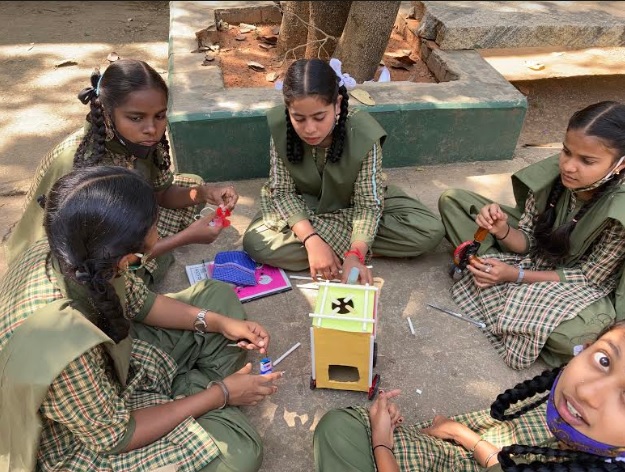Bengaluru, Karnataka, India
- Over 1.2 lakh high school students in Karnataka will benefit from this future-forward initiative designed to nurture a STEM mindset among young girls.
- Some of the projects taken up by the students in the pilot phase include a sanitary pad disposal machine, sanitary pad dispenser, smart COVID detection mask, mobile controlled voice guide for elderly, and forest fire detection systems, among others.
Quest Alliance and IBM today announced the launch of its ‘Hackathon’ programme to promote scientific thinking and build a STEM mindset among girl students in rural Karnataka.
 |
Highschool girls working on a prototype during the Pilot phase of Hackathon
The initiative will reach 1.2 lakh girl students from 800 High schools across the State over a three-year period. In the first year, the Hackathon will cover 68,272 students in seven districts: Chikkaballapura, Bengaluru, Hassan, Chitradurga, Raichur, Gadag and Yadgir.
Addressing a press conference here today, Aakash Sethi, CEO, Quest Alliance said, “As technology and digitisation continue to shape career opportunities for young people, a STEM mindset will be the key to empowered futures and careers for young girls. This initiative aims to counter prevailing gender stereotypes by encouraging girls to engage with, and discover their own potential within STEM (Science, Technology, Engineering and Mathematics) disciplines.”
Teachers from the 800 identified schools will be trained to handhold students through their Hackathon projects. A Hackathon consists of three stages – students participate in an ‘Ideathon’ in the first stage, where they discuss ideas and their practicability. In the second stage, students are provided with a basic technology kit consisting of sensors, batteries, wires etc., and are connected to mentors and experts who help them develop their ideas and build prototypes. These prototypes are then showcased to other students and the larger community in the third stage.
The Hackathon model is designed to take students through the entire lifecycle of a project – from identifying the problem, establishing a problem statement, visualising a solution, execution and feedback. More importantly, it makes STEM fields relevant to the lives of young girls, as they are able to identify day-to-day problems within their community and develop a tech solution for them.
Speaking about the project, Neha Parti, Director – Schools Programme, Quest Alliance, said, “During the pilot, we observed that girls lacked confidence in their ability to work with technology. By the end of the project, there was a shift in their confidence levels and their abilities to solve problems. They saw themselves as innovators.”
In the pilot phase conducted by Quest Alliance, around 1000 students from Karnataka went on to build their prototypes as part of the Hackathon. Forty of these solutions were later selected for the ‘Inspire Manak’ awards.
The Hackathon initiative is part of IBM’s STEM For Girls initiative, which aims to empower young girls with the right skills and mindsets to negotiate better careers and futures for themselves. Manoj Balachandran, Head of CSR, IBM (India and South Asia), said, “Hackathons are a great way to kindle curiosity and nudge students towards solutions for problems they see around them. Our pilot in Karnataka has resulted in over 1000 ideas from students where 40 of them also got selected for the National Ideathon challenge called MANAK, proving that all you need is a trigger and a platform for the young minds.”
(Disclaimer: The above press release comes to you under an arrangement with NewsVoir India and this publication takes no editorial responsibility for the same)
